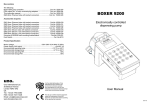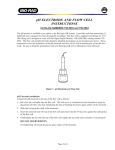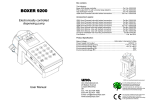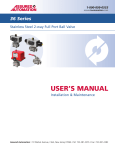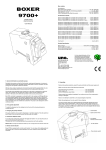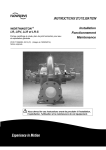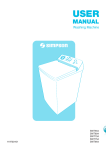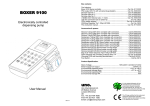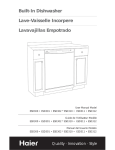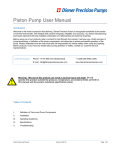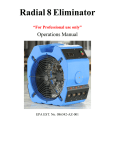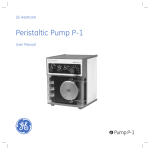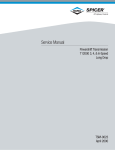Download Ultrasonic Cleaners User Manual SH-Series
Transcript
Ultrasonic Cleaners User Manual SH-Series Warranty Ultrasonic Cleaners, when used in accordance with manufacturer's instructions and under normal use, are guaranteed for one year parts and labor and an additional year of parts only. Within the period guaranteed, manufacturer will repair or replace free of charge, at its sole discretion, all parts that are defective because of material or workmanship, not including costs for removing or installing parts. Liability, whether based on warranty, negligence or other cause, arising out of and/or incidental to sale, use or operation of the transducer elements, or any part thereof, shall not in any case exceed the cost of repair or replacement of the defective equipment, and such repair or replacement shall be the exclusive remedy of the purchaser, and in no case will we be responsible for any and/or all consequential or incidental damages including without limitation, and/or all consequential damages arising out of commercial losses. CAUTION Do not place parts or containers directly on the bottom of the cleaning tank; use a tray or wire to suspend items. Do not allow the solution to drop more than 1”1/2 inch below the top of the tank. Do not ever use alcohol, gasoline, or flammable solutions. Doing so could cause a fire or explosion. Use only water-based solutions. Do not use mineral acids. These could damage the tank. Contents Front Cover 1. Safety Precautions 2. Introduction 3. Ultrasonic Cleaners 4. Accessories 5. Unpacking Your Cleaner 6. Installing Your Cleaner 7. Equipment Specifications 8. How Ultrasonic Cleaning Works 9. Operating Your Cleaner 10. Draining Your Cleaner 11. Optimizing Your Cleaner 12. Application Hints 13. Cleaning Methods 14. Cleaning Solution 15. Trouble Shooting 16. Service Information WARRANTY SAFETY PRECAUTIONS Before using your Ultrasonic Cleaner, please read and thoroughly understand these safety precautions. Failure to follow them may result in serious personal injury or property damage. To avoid electrical shock: Unplug from power source before filling or emptying the tank. Keep the control panel and the area around the cleaner clean and dry -- wipe up solution which spills over the tank brim. Water and high voltage can cause electrical shock. Do not operate the cleaner without proper grounding. Do not remove the grounding prong on the line cord plug. Do not disassemble your cleaner -- high voltage inside the cleaner is dangerous. Do not immerse the cleaner in water. To prevent personal and/or property damage: Operate the cleaner with a vented cover or no cover. Use water-based solutions. Do not ever use alcohol, gasoline, or flammable solutions. Doing so could cause a fire or explosion and will void your warranty. Use only water-based solutions. Do not ever use mineral acids. These could damage the tank. Do not touch the stainless steel tank or cleaning solution -- they may be hot. Do not allow fluid temperature to exceed 70°C (160°F). Do not place your fingers or hands into the tank while the cleaner is operating. Doing so may cause discomfort and possible skin irritation. Avoid contact with solutions and provide adequate ventilation. Do not use solutions containing chlorine bleach. To prevent damage to the cleaner: Change your solution regularly. Do not cover vents on the housing. Do not operate the cleaner dry. Do not place parts or containers directly on the bottom of the cleaning tank; use a tray or wire to suspend items. Failure to comply may cause transducer damage and will void your warranty. Do not allow the solution to drop more than 1½ inch from top of tank with heat or ultrasonics on. Failure to comply may cause transducer and/or heater damage and will void your warranty. The fill line is 1” from top of the tank. Introduction Ultrasonic Cleaners These SH-Series line of ultrasonic cleaners includes seven models with sizes ranging from 46 Liter (18 gallon), 28 Liter (7.5 gallon), 17 Liter, 15 Liter (4 gallon), 10 Liter, 6 liter, 4 liter, 3 Liter, 2 liter, and 0.7 liter. Each model is constructed using durable industrial style 40 kHz transducers. These provide increased cleaning power along with built in sweep frequency to ensure uniform cleaning activity throughout the bath. The five larger sizes have built in drains. Each model has a digital timer and mechanical thermostat, with a power switch/fuse in the rear of the machine. When you first fill your unit, or refill it with fresh solution, use warm water for the solution. Turn on the heater (Rotate the HEAT knob to 45, if available. The 0.7 liter units don’t have a heater.), turn on the ultrasonics (press the green on touch screen button, and use the arrow buttons for timing purposes), add the cover, and the solution will heat quickly to temperature. Accessories For Your Cleaner Accessories include a cover and a mesh basket. Unpacking Your Cleaner Please check your cleaner and its carton carefully for any external or internal damage. If you find damage, contact your shipping carrier immediately, before contacting your distributor. Please retain your packaging for future use. Installing Your Cleaner Check the plate on the back of the cleaner for correct power requirements. Position your cleaner within easy reach of a standard grounded electrical outlet. Do not place the cleaner on a circuit which could become overloaded. If your cleaner does not operate correctly, first refer to the troubleshooting section for possible causes, or contact an authorized service center listed at the back of this manual, for additional information. Equipment Specifications Tank Capacity Ultrasonic Frequency Khz 0.7 Liter 40 Khz 2 Liter 40 Khz Unit Dimensions (L x W x H) Tank Dimensions (L x W x H) Weight Power Supply U.S. Power (Watts) Warranty Heat (w/ Temp Control) 6.5” x 4.5” x 6.5” 6” x 3.5” x 2.5” 3 lbs. AC 100 ~ 40 W 1yr prts/lbr No (L x W x H) (L x W x H) 7.5” x 7” x 8.5” 6 x5.25”x3.75” (L x W x H ) (L x W x H) 10.5” x 8” x 8.5” 9” x 5.5” x 4” (L x W x H ) (L x W x H) 5.5 lbs. 120v, 50 + 1 yr / 60Hz parts. AC 100 ~ 80 W 120v, 50 4 Liter 40 Khz 40 Khz 8 lbs. AC 100 ~ parts. 120 W + 1 yr / 60Hz parts. 12” x 6” x 3.75” 10.5 AC 100 ~ (L x W x H) (L x W x H) lbs. 120v, 50 14” x 8” x 11.5” 12” x 6” x 6” 12 lbs. (L x W x H) (L x W x H) 180 W 10 Liter 40 Khz 40 Khz (2.5 Gallon) 13"×11"×14.5" 11.5"×9"×6" (L×W×H) (L×W×H) 18 lbs. AC 100 ~ 1yr prts/lbr Yes Yes + 1 yr / 60Hz 6 Liter 1yr prts/lbr 120v, 50 13” x 7.7” x 10 Yes + 1 yr / 60Hz 3 Liter 1yr prts/lbr parts. 180 W 1yr prts/lbr 120v, 50 + 1 yr / 60Hz parts. AC 100 ~ 600 W 1yr prts/lbr 120v, 50 (300W + 1 yr / 60Hz Ultra & parts. Yes Yes 300W Heat) 15 Liter 40 Khz (4 Gallon) 13.5 x12.5 x15.5” 12” x 11” x 6” (L x W x H) (L x W x H) 40 lbs. AC 100 ~ 1000 W 1yr prts/lbr 120v, 50 (500 Ultra + 1 yr / 60Hz & 500 parts. Yes Heat) 17 Liter 40 Khz (4.6 Gallon) 13"×14"×15" 12"×11"×8" (L×W×H) (L×W×H) 40 lbs AC 100 ~ 900 W 1yr prts/lbr 120v, 50 (500 Ultra + 1 yr / 60Hz & 400 parts. Yes Heat) 28 Liter 40 Khz (7.5 Gallon) 24“ x 13 “ x 15“ 19.5” x 11” x 8” (L x W x H) (L x W x H) 60 lbs. AC 100 ~ 1120 W 1yr prts/lbr 120v, 50 (720 Ultra + 1 yr / 60Hz & 500 parts. Yes Heat) 46 Liter (18 Gallon) 28/40 Khz 26” x 22” x 15” 24” x 19” x 9” (L x W x H) (L x W x H) 180 lbs. AC 100 ~ 2400 W 1yr prts + 120v, 50 (1200 lbr + 1 yr / 60Hz or Ultra & parts. 220/240 1200 V Heat) Yes How Ultrasonics Work Dirty items come clean in ultrasonic cleaning systems when millions of superheated bubbles scrub grime and oxidation away with stunning results. How? Through the process of de-cavitation. Ultrasonic cleaning systems send high frequency sound waves ripping through an ultrasonic cleaning solution leaving superheated bubbles in the waves’ wake. When these bubbles, called cavitations, collapse, called decavitation, the heat and energy of their implosions work with the specially formulated ultrasonic cleaning solution to remove dirt, oils, residue, and oxidation from the surface of the contaminated item. Imagine the ability to get into the tiniest of nooks and crannies where dirt and grime hide, and then imagine scrubbing that surface ultra clean. With conventional cleaning – brushes, rags and elbow grease – this task seems impossible. But the cavitating cleaning action of an ultrasonic cleaning system does just that – It goes where brush bristles can’t. What is Ultrasonic Cleaning Technology? Ultrasonic cleaning technology is high frequency sound waves creating a phenomenon in a fluid called cavitating action, or cavitations. Cavitations, the superheated bursting of bubbles in a fluid, are what make ultrasonic cleaning work. How Can Sound Waves and Ultrasonic Cavitations Clean? When a sound wave travels through fluid, it stretches and compresses the fluid to transmit sound. When the sound wave's amplitude increases to a threshold level, when the fluid cannot hold the “stretch” of the sound wave, the sound wave energy literally tears the water apart and vacuum bubbles are formed. Each vacuum bubble grows in size until it can grow no more – equilibrium is reached between the bubble and the fluid – at equilibrium, the bubble is compressed by the surrounding fluid pressure until it collapses. At collapse, a tiny liquid jet is created in the bubble’s place. Each liquid jet creates estimated temperatures and pressures of over five thousand degrees Celsius and ten thousand PSI when the collapse occurs. The extreme pressure and temperature of the jet provides the phenomenon responsible for the effective ultrasonic cleaning action. This action occurs millions of times, over and over, while the sound waves are traveling through the fluid. Ultrasonic Cleaning Cleans Every Nook and Cranny When the item being cleaned is submerged in the ultrasonic tank’s fluid, the millions of jets created by ultrasonic energy are capable of reaching into fine depressions and intricate details. Every surface area is exposed to the ultrasonic cleaning action; cracks, crevices and hard to reach corners of every nook and cranny get cleaned by the ultrasonic cavitating action. Ultrasonic sweep cleaning technology enhances the system’s ability to clean. Ultrasonic Cleaning Power and Frequency Ultrasonic system power is rated in how much energy, in watts, is generated in the ultrasonic tank. Higher power systems generally mean shorter part immersion times in the fluid. The ideal cleaning frequency is determined by the size of dirt being cleaned. Simply speaking, higher frequencies are more capable it is of removing smaller particles, lower frequencies are better suited for large dirt particles. Many SharperTek® ultrasonic systems can be configured with multi-frequency technology, giving you the benefit of multiple cleaning frequencies in a single design package. Operating Your Cleaner If this is the first time you are using the cleaner, please read this whole section before operating your cleaner. Operating Your SH-Series Cleaner SH-SERIES Panel (Note: there is no heat light indicator or temp control knob for 0.7 L) SH-Series 0.7 Liter (No Heat) Explanation of Controls Control Function HEAT Activates heat to 70 C Maximum. TIMER Activates ultrasonics and sets time. Turn Knob to desired heat. Turn clockwise to hold position for continuous heat operation. Before You Start Cleaning CAUTION! Do not place parts or containers directly on the bottom of the cleaning tanks; use a tray or wire to suspend items. Do not allow the solution to drop more 1 ½” from top of tank. Do not ever use alcohol, gasoline or flammable solutions. Doing so could cause a fire or explosion. Use only water-based solutions. Do not ever use mineral acids. These could damage the tank. Failure to comply with these cautions will void your warranty. Step Action 1 Select your cleaning solution (refer for solution effects on metals) 2 3 Allowing for the volume of the parts you will be cleaning and operation level line (one inch from the top) Add cleaning solution to the tank of water 4 Plug the cleaner into a ground outlet NOTE: If this is the first time you are running the cleaner, or if you have changed cleaning solution, you must degas the solution. If not, skip to “Cleaning Items”. Degassing Step 1 2 Action Turn the HEAT ON (Unless its 0.7 Liter) Turn the TIMER to 5-10 and let the cleaner run to allow the solution to “degas”. Cleaning Items NOTE: To stop ultrasonics at any time, press red off button. Step Action 1 2 3 Set the TIMER for the amount of time you wish the items to be cleaned. Place the items into a basket. Slowly lower the basket into the tank. Do not allow items to contact the tank bottom. When items are clean and time is up, slowly remove them from the cleaner. Rinse the clean items with clean water and dry them, if necessary. 4 5 Operating Your Cleaner Control On button Off button Timer control buttons Digital Timer Display Temperature Knob Heat Light Indicator Function Green touch button located on the left lower half of panel. Press to activate power to cleaner. Red touch button located on the middle lower half of panel. Press to deactivate power to cleaner. The two blue touch buttons located in between the on/off buttons. Use to select the amount of time you want the machine to run. Up arrow increases time by 5 minutes and down arrow decreases time by 5 minutes. Note: machine will power off when timer is finished. Displays select time for cleaning. Located on the right side of panel. Used to set cleaner at desired temperature (In Celsius). The temperature ranges from O° Celsius to 70° Celsius. Red “Heat Light Indicator” turns on indicating that the heat on cleaner is active. Draining Your Cleaner Warning Do not immerse the cleaner in water. Unplug the cleaner from the power source. 0.7L, 2L, 3L, 4L, and 6L models do not have a drain. To empty, use the side of the rim to pour the used solution into a waste disposal unit, rinse the tank thoroughly and refill with new solution. The 10 Liter, 15 Liter (4 gallon), 17 Liter, 28 Liter (7.5 gallon), and 46 Liter (18 gallon) models include a drain. (Drain not attached. Thread sealant and do not over tighten.) Step 1 2 3 4 5 Action Place the cleaner to allow easy reach of the drain tube into a waste disposal unit. Remove the thread protecting cap from the end of the cleaner's drain pipe. This will expose the white Teflon sealing tape on the drain pipe's threads. Hand tighten the drain valve onto the drain pipe over the white Teflon sealing tape. Finish tightening the valve in place using on adjustable or a 21mm wrench. Tighten the valve no more than one full turn when using the wrench until the handle is on top. CAUTION: Over tightening of the valve can cause damage to the ultrasonic tank. Always use Teflon sealing tape or a sealing paste designed for use with stainless steel if retightening or refitting of the drain valve is required. Hand tighten the hose adaptor into the end of the drain valve. Slide the drain tube over the barbed hose adaptor end. Close the drain valve by turning the handle perpendicular to the valve body and the cleaner is ready to fill with solution. To open the valve and drain the cleaner, turn the handle so that it is in line with the valve body. Optimizing Your Cleaner Tanks: Cleaning - check the tank for contamination whenever you change solution. If necessary, remove contaminants with a nonabrasive cloth and water. Emptying - always unplug the cleaner before emptying the tank. Empty the solution into a waste disposal unit. Filling - always unplug the line cord before filling the tank. Fill the cleaner to the operating level (one inch from the top with beaker/tray in place), using warm tap water. Low solution level - will cause the cleaner to fail. When you remove heavy or bulky loads from the cleaner, the solution level may drop below the operating level. If so, be sure to replace lost solution and degas, if necessary, depending on the amount used. Overload - do not rest any items on the tank bottom. Weight on the tank bottom dampens sound energy and will cause damage to the transducer. Instead, use a tray and/or beaker positioning cover to support all items. Allow at least one inch between the tank bottom and the beaker or receptacle for adequate cavitation. Covers - allow the cleaner to heat up faster, to a higher temperature, and avoid excessive liquid evaporation. Temperature Heater - the heater may cause some discoloration of the tank wall. This is normal and will not affect the performance of the unit. Solution - the fastest method to heat your cleaner is to fill with warm solution, use heat, ultrasonics (which also adds heat), and a cover. Solution activity - the amount of visible activity is not necessarily related to optimum cavitation for cleaning. Degassing - fresh solutions contain many dissolved gases (usually air), which reduce effective ultrasonic action. Although solutions will naturally degas over time. Solutions that have been sitting unused for 24 hours or longer have reabsorbed some gases. Heat - increases the chemical activity of cleaning solutions. Surface tension - can be reduced by adding solution to the bath. Reduced surface tension will increase cavitation intensity and enhance cleaning. Solvents - never use solvents. Vapors of flammable solutions will collect under the cleaner, where ignition is possible from electrical components. Renewal- replace cleaning solutions often to increase ultrasonic cleaning activity. Solutions, as with most chemicals, will become depleted over time. Solutions can become contaminated with suspended soil particles which coat the tank bottom, inhibiting ultrasonic activity. Application Hints CAUTION Never clean novelty or inexpensive jewelry in the cleaner. The combination of heat and vibration may loosen a cement-held setting. Never clean gemstones such as emerald, amethyst, pearl, opal, coral, turquoise, peridot or lapis lazuli in the cleaner. First time cleaning - first experiment with one piece, then proceed with the remainder. Solution level- Be sure to maintain solution level within 1 ½” of top of the tank. Surface activity can vary with liquid level. Load size - It is faster and more efficient to run several small loads rather than a few big loads. Placing items - Never allow items to sit on the bottom of the tank. Always place them in a tray or beaker or suspend in the solution. Rinsing items - After cleaning, use a clean water bath to rinse away chemicals adhering to items. Lubricating items - When necessary, re-Iubricate items immediately after cleaning. Drying items - Air drying at room temperature works for some items. Place parts requiring faster drying time under hot air blowers or in ovens. Cleaning Methods There are two methods of cleaning - direct and indirect. Each has advantages and disadvantages. When in doubt, run test samples using both methods to decide which one produces the best results for you. Direct method Items in perforated insert tray Item suspended How it works: Fill the tank with warm water and a cleaning solution. Place the items to be cleaned in a perforated tray and lower them into the tank. You can also suspend items on a wire and then immerse them in the solution. The advantages of this method are the simplicity of operation and cleaning effectiveness. Indirect method Items laid randomly in solid insert tray Items placed in beakers How it works: Fill the tank with warm water and a cleaning solution. Pour your solution medium into one or more beakers or into a solid insert tray. Place the beakers in a beaker positioning cover or a solid insert tray to fit your cleaner. Beakers should not touch the tank's bottom. The advantages of this method are: • Removed soil stays in the beaker or tray so you can easily examine, filter or discard it. • You can use one or more solutions at the same time. - Two completely different cleaning solutions. - One beaker or tray with a cleaning solution and one with a rinse solution. • Cleaning solution in your tank needs to be changed less often. Cleaning Solutions CAUTION Do not use alcohol, gasoline, bleach, mineral acids, solutions with a flash point, semi-aqueous or combustible liquids in ultrasonic tanks, or you will void the warranty. Only use non-flammable solutions and water-based solutions. Solution Types Water-based solutions are either slightly acidic or alkaline. They include detergents, soaps and industrial cleaners designed to remove specific soils. Acidic water-based solutions: remove rust, tarnish or scale. They range from mild solutions that remove tarnish, to concentrated, and inhibited acidic solutions that remove investment plaster, milk-stone, zinc oxide and rust from steel and cast iron as well as smut and heat-treat scale from hardened steel. Alkaline water-based solutions: include carbonates, silicates and caustics. These cause emulsifying action, which keeps soil from redepositing on the cleaned surface, and improves cleaning action in hard water. Alkaline strength Mild Mild to Strong Heavy-duty Removes: Light oils and greases, cutting oils and coolant compounds. Heavy grease and oil, waxes, vegetable oils, inks, wax or fatbase buffing and polishing compounds, milk residues and carbohydrates. Mill scale; heat-treat scale, corrosion or oxides. Change the cleaning solution periodically. Cleaning solutions can become contaminated with suspended soil particles which coat the tank bottom. This coating dampens the ultrasonic action and reduces cleaning efficiency. Certain solutions will cavitate better than others. Contact your local distributor for further information. Heat and cavitation: increase the chemical activity of cleaning solutions. Some materials may be damaged by this stronger chemical action. When in doubt, test run samples of items to be cleaned. Caustic solutions: used to remove rust from steels, metal alloy corrosion and a variety of tenacious soils. Solution Amounts Solution amounts may vary. The amount you use depends on the detergent and the type of soil to be removed. Follow instructions on the solution container and refer to the table below for the effects of solutions on metals. Chemicals Harmful to Your Tank The following chemicals will harm your ultrasonic tank and the action of ultrasonics and higher operating temperatures will increase their chemical activity. Do not use these or similar chemicals directly or in dilution in your ultrasonic tank or you will void your warranty. Acetophenone Aluminum Chloride Aluminum Fluoride Aluminum Sulphate Ammonium Bifluoride Ammonium Chloride Ammonium Hydroxide Amyl Chloride Antimony Trichloride Aqua Regia Bromine Calcium Bisulfate Calcium Bisulfite Calcium Hypochloride Chloracetic Acid Chloric Acid Chlorine, Anhydrous Chromic Acid Copper Chloride Copper Fluoborate Ethyl Chloride Ferric Chloride Ferrous Chloride Ferris Sulfate Fluoboric Acid Fluorine Hydrobromic Acid Hydrochloric Acid Hydrocyanic Acid Hydrofluoric Acid Hydrofluosilicic Acid Iodoform Mercuric Chloride Muriatic Acid Phosphoric (crude) Sodium Hypochlorite Potassium Chloride Stannic Chloride Stannous Chloride Sulfur chloride Sulfuric Acid Zinc Chlorid Solution Effects on Metals Cleaning Agent Optical (1) Jewelry (1) Oxide (2) Remover 1831 Electronic cleaner 1220 General(1) Steel Brass None None Slight Etch None none none none none none none Purpose 1220 Aluminum none none slight attack slight attack slight Magne sum none" none attacks Zinc S. Steel Tin none" none attacks none none none none" none none none none none none none none none none attack Metal (1) 1852 Rust (3) stripper none none none none none none none none none attacks attacks attacks none slight attack (1) = Alkaline; (2) = ACidic; and (3) = Caustic. (2) Warning *Free hydrogen may be released if solution comes in contact with reactive metals. ** no effect if solution temperature is less than 140°F. Troubleshooting If your cleaner does not operate satisfactorily, please check the tables below for possible causes before calling your authorized service center. Warning High voltage inside - dangerous shock hazard. DO NOT attempt to disassemble or repair the cleaner. Problem Cleaner will not start. Cause What to do Cleaner not plugged in properly Plug into functioning electrical outlet. Rear power switch not in on position. Press power switch ON. Lose terminal. Lose Bad touch pad panel. Digital timer - Start button malfunctioning. Cleaner operates but does not heat solution. Clogged drain Call nearest authorized service center. Blown fuse. Replace with identical fuse or Call service center. nearest authorized Heater malfunction Call nearest authorized service center. Mechanical Thermostat - HEAT not set to ideal temperature Lose terminal or bad heater. Turn heat ON. Clogged drain. Open drain. Warning High voltage inside - dangerous shock hazard. DO NOT attempt to disassemble or repair the cleaner. Problem Cleaner operates but does not maintain set temperature. Cause Malfunctioning heater or sensor components. Interrupted calibration sequence. Cleaner operates but display does not function. Timer board malfunctions. What to do Call nearest authorized service center. Press SET DISPLAY. Call nearest authorized service center. Bad touchpad panel. Solution is not degassed. Solution is spent. Solution level is incorrect for load. Decreased ultrasonic activity. Tank bottom is covered with soil particles. Using deionized water in the tank. Make sure that tank was filled with warm tap water plus cleaning solution and has run 5-10 minutes. Change solution. Adjust solution to within 1 ½” from top of tank, filled with warm tap water. Empty, then clean tank with warm water. Wipe with a nonabrasive cloth. Deionized water does not cavitate as actively as soapy tap water. Service Information With normal use, your Ultrasonic Cleaner should not require servicing. However, if it fails to operate satisfactorily, first try to diagnose the problem by following the suggestions in the Troubleshooting Guide. Warning High voltage inside the cleaner is dangerous. If you find that your cleaner needs repair, carefully pack and return it to Sharpertek. If under warranty, remember to include proof of purchase. Your cleaner will be shipped by ground service unless you specify otherwise. Technical Support: Sharpertek 2005 Pontiac Rd Bldg A Tel: 248-340-0593 Auburn Hills MI 48326 Fax: 248-340-6189 USA [email protected]




















